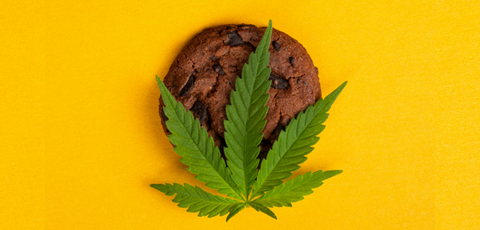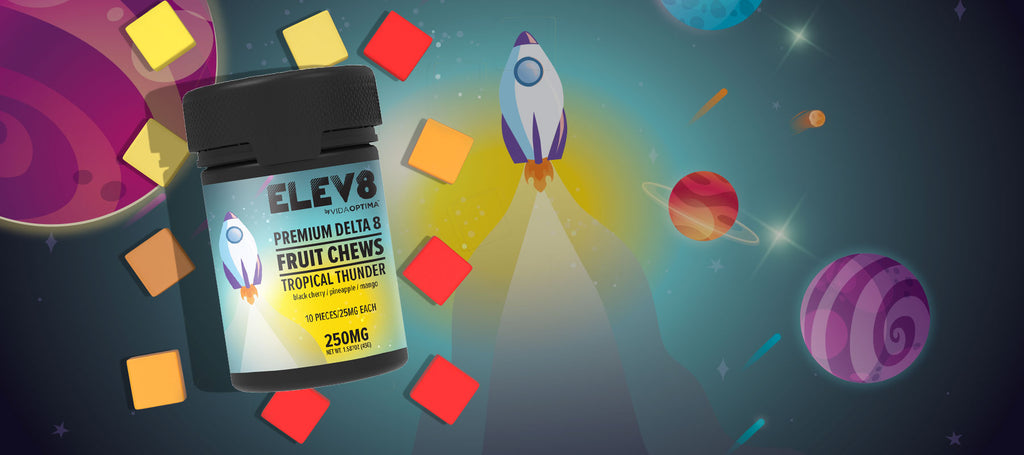Your Cart is Empty
FREE SHIPPING ON ALL ORDERS $75+
Cannabis edibles offer a convenient and discreet way to consume cannabis, and they may help seniors in managing a range of ailments that become more common as we age. The question is–are edibles safe for seniors?
In general, yes, edibles can be a useful dosing method for seniors hoping to take advantage of the medicinal benefits of cannabis. Still, their potency and delayed onset effects can pose additional risks for older adults.
Understanding how to use edibles safely is crucial for seniors who are considering incorporating them into their wellness routine. Here’s what you should know:
Table of Contents
Why Edibles?
Safety Considerations for Seniors
Tips for Using Edibles Safely
Conclusion
Where to Buy
As cannabis becomes more widely accepted, many seniors are exploring its potential benefits, including pain relief, improved sleep, and anxiety reduction.

Among the various consumption methods, edibles stand out for their discretion and ease of use, making them an appealing option for seniors new to cannabis. Many seniors prefer edibles over smoking because they don’t put stress on the lungs.
Edibles offer several potential health benefits, ranging from pain relief to neuroprotection:

As you can see, there are many reasons why seniors may take interest in edibles, especially if they are medical marijuana patients who already benefit from other forms of cannabis. Still, as we age, we need to take more precaution against cannabis side effects.
Let’s take a look at some safety precautions seniors can take when using edibles:
Edibles may produce stronger effects than other cannabis products due to the way they are metabolized. In the gut, Delta-9-THC is transformed into 11-hydroxy-THC, which is known for producing more potent psychoactive reactions. For this reason, THC edibles often produce stronger effects than inhalation methods, even at the same dosages.
According to the most current research on medicinal cannabis dosing, seniors should begin with a low dose of THC, typically around 2.5mg to 5mg, and wait at least two hours before considering additional doses. This approach helps minimize the risk of overconsumption and allows individuals to gauge their sensitivity to cannabis.
While research on the effects of cannabis on cardiovascular health is limited, seniors with concerns about their heart health should opt for low doses and CBD-rich strains, which may help mitigate potential risks.
Cannabis often leads to dry mouth, once thought to be a side effect of dehydration. Now, though, we know that there is no evidence that cannabis causes dehydration. Instead, cannabis causes the salivary glands to temporarily stop producing saliva, leading to dry mouth and increased thirst. This, on its own, is not an issue, but it may worsen any dry mouth symptoms related to other medications, so it’s something to consider.
Cannabis has the potential to interact with various medications commonly used by seniors, which can impact their health and well-being. These medications include (but are not limited to):
Understanding the potential interactions between cannabis and these medications is crucial for seniors to avoid adverse effects and ensure the safe and effective management of their health conditions. It's essential for seniors to consult with their healthcare providers before incorporating cannabis into their wellness routine, especially if they are taking any of these medications.
While many people enjoy cannabis with no adverse reaction and even benefit greatly from its therapeutic effects, it is possible to experience side effects. Seniors may be at a greater risk for experiencing some of these side effects, especially:

Edibles come in various forms, including chocolates, gummies, baked goods, and beverages. Seniors should carefully read the labels to understand the potency of the product and the recommended serving size.
Some products may be labeled to show the total THC content per serving, while others will show the total THC content for the entire package. For instance, a chocolate bar that's divided into 10 servings and contains 300 milligrams of THC total will offer 30 milligrams of THC per piece.
If it’s your first time using cannabis edibles or you are inexperienced with cannabis in general, you should definitely start with a low dose. Edibles produce stronger effects than other dosing methods.
You may also consider looking at the dosage advantages of different edible products, like tinctures vs gummies. Tinctures may allow you more precise control over your dosage.
Seniors who haven't used cannabis may benefit from having a sober “trip sitter.” around during their first experience. A trip sitter is a person who can help provide assistance and peace of mind in certain situations, such as feeling anxious Or experiencing discomfort.
Cannabis may cause dry mouth and increased hunger, so having plenty of water and healthy, enjoyable snacks is a must. Many mild side effects related to cannabis may stem from dehydration, so making sure to stay hydrated can help ensure a positive experience. Plus, taking edibles on an empty stomach may potentiate their effects, so have a snack with your dose.
Cannabis regulations vary widely from state to state, so it's important to ensure that products are purchased from high quality sources. Cannabis edibles purchased from a state licensed dispensary will have third party tested approval.
Hemp edibles purchased online, like Delta-8-THC edibles, should come from an experienced manufacturer that uses third-party testing to ensure label accuracy and that the products are free from contamination.
Seniors who are more sensitive to the psychoactive effects of THC may prefer CBD (cannabidiol)-dominant edibles. CBD is non-intoxicating and is believed to have potential therapeutic benefits such as pain relief, anxiety reduction, and improved sleep quality.
CBD-dominant edibles provide the medicinal benefits of cannabis without the euphoria associated with THC. Products that contain both THC and CBD may provide more balanced effects with milder psychoactivity.
Alternatively, some hemp THC products produce milder effects than traditional cannabis. For instance, Delta-8 is widely regarded for its therapeutic effects, but is only half as potent as Delta-9-THC.
To learn more, you may want to read:
Cannabis edibles often look like regular candies, cookies, or snacks, which can be misleading for unsuspecting people. Keep cannabis edibles out of reach of children and pets and store them in a secure location.
Seniors should be mindful of proper storage to prevent accidental ingestion and ensure the longevity of the product. Because edibles are food products, they may spoil quickly when not stored properly.
Before incorporating cannabis edibles into their wellness regimen, seniors should consult with a healthcare professional, especially if they have underlying medical conditions or are taking medications that may interact with cannabis. A healthcare provider can offer personalized guidance and recommendations based on individual health needs.
Cannabis edibles can offer a safe therapeutic avenue for seniors when used under a doctor's guidance. Like all cannabis products, using edibles safely requires careful consideration of dosage, potency, product quality, and individual tolerance.
Starting with a low dose, reading labels attentively, and practicing patience are essential steps to mitigate risks and enjoy the potential benefits of edibles responsibly. By following these guidelines and consulting with healthcare professionals when needed, seniors can incorporate cannabis edibles into their wellness routine safely and effectively.
At Vida Optima, our therapeutic hemp collection includes CBD, CBD, and hemp-derived THC products–all farm bill compliant and easy to order online. Our Vitality CBD Collection utilizes full-spectrum CBD made from premium, organically grown hemp and is 100% Farm Bill compliant.
Or, check out our Elev8 and Cloud9 Collections for a variety of mild-to-moderately doses hemp-THC products. Choose from our tantalizing collection of sublingual edibles, gummies, topicals, tinctures, and more–reaping the benefits of hemp has never been easier.

Comments will be approved before showing up.



